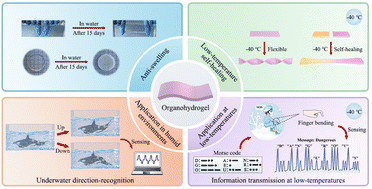Flexible electronic devices based on hydrogels have attracted impressive attention. However, conventional hydrogels tend to suffer from swelling in aquatic environments and inevitably freeze under low-temperature conditions, resulting in the destruction and loss of their structure and performance. Thus, it is extremely necessary, but generally challenging, to create a wet-resistant and anti-freezing gel for maintaining excellent stability in various extreme environments. Herein, a multipurpose organohydrogel is constructed by a simple and rapid UV-initiated polymerization method. The introduced polyvinylpyrrolidone (PVP) effectively enhances the wet-resistant capability and self-healing property of as-prepared organohydrogel, and meanwhile, the dimethyl sulfoxide (DMSO)/H2O binary solvent system endows the organohydrogel with superior low-temperature tolerance. Furthermore, the organohydrogel-based strain sensor can be used as a long-term wet-resistant flexible sensing device to precisely track various stretching deformations and complex human movements in water, pH 2.3 and pH 9 liquid media and exhibits a very attractive feature in distinguishing the direction of underwater movements. In addition, the resulting organohydrogel can withstand significant mechanical damage even in extremely cold environments of −40 °C. At the same time, after being stored at −40 °C for 15 days, the healed organohydrogel sensor is still capable of reliably recognizing the bending motion of a prosthetic finger at −40 °C. Impressively, based on the Morse code expression, the organohydrogel sensor can also serve as a low-temperature tolerant communication device for delivering various useful messages to the receiver in harsh climates. It is believed that this study offers a promising prospect for developing flexible electronics with multi-environmental stability.
